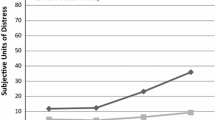Abstract
This study evaluated three hypotheses derived from a cognitive behavioral model of depression. It was predicted that clinically depressed subjects, relative to psychopathological and normal controls, would underestimate their recall of high but not of low rates of externally controlled positive feedback. Although no specific prediction was made, data were also collected to determine whether such a cognitive distortion, if it occurred, took place at the point of stimulus perception or at some subsequent state of cognitive processing. Finally, it was predicted that the clinically depressed subjects, relative to the control subjects, would distort their perception of neutral feedback in a negative direction. The data indicated that the depressed subjects recalledhaving received less positive feedback than did the controls at the high but not the low rate of feedback. No between group differences were obtained for the subjects' immediate perception of positive or of neutral feedback. The implications of these data for the cognitive behavioral conceptualization and treatment of depression are discussed.
Similar content being viewed by others
Reference Note
Craighead, W. E., Nelson, R. E., Wilcoxon, L. A., & Schrader, S. L.An integrative model for the study and treatment of depression. Paper presented at the meetings of the Association for the Advancement of Behavior Therapy, San Francisco, December 1975.
References
Beck, A. T.Depression: Causes and treatment. Philadelphia: University of Pennsylvania Press, 1967.
Beck, A. T. The development of depression: A cognitive model. In R. Friedman & M. Katz (Eds.),The psychology of depression: Contemporary theory and research. Washington, D.C.: Winston-Wiley, 1974.
Beck, A. T.Cognitive therapy and the emotional disorders. New York: International Universities Press, 1976.
Beck, A. T., Ward, C. H., Mendelson, M., Mock, J., & Erbaugh, J. An inventory for measuring depression.Archives of General Psychiatry 1961,4 561–571.
Lazarus, A. A. Learning theory and the treatment of depression.Behaviour Research and Therapy 1968,6 83–89.
Lewinsohn, P. M. A behavioral approach to depression. In. R. J. Friedman & M. Katz (Eds.),The psychology of depression: Contemporary theory and research. Washington, D.C.: Winston-Wiley, 1974.
Loeb, A., Beck, A. T., & Diggory, J. C. Differential effects of success and failure on depressed and nondepressed patients.Journal of Nervous and Mental Disease 1971,152 106–114.
Mischel, W. Toward a cognitive social learning reconceptualization of personality.Psychological Review 1973,80 252–283.
Nelson, R. E., & Craighead, W. E. Perception of reinforcement, self-reinforcement, and depression.Journal of Abnormal Psychology 1977,86 379–388.
Seligman, M. E. B.Helplessness: On depression, development and death. San Francisco: W. H. Freeman, 1975.
Wener, A. E., & Rehm, L. P. Depressive affect: A test of behavioral hypotheses.Journal of Abnormal Psychology 1975,84 221–227.
Wilcoxon, L., Schrader, S., & Nelson, R. E. Behavioral formulations of depression. In W. E. Craighead, A. E. Kazdin, & M. J. Mahoney (Eds.),Behavior modification: Principles, issues, and applications. Boston: Houghton Mifflin, 1976.
Zuckerman, M., & Lubin, B.Manual for the multiple affect adjective check list. San Diego, California: Educational and Industrial Testing, 1965.
Author information
Authors and Affiliations
Additional information
This research was partially supported by a grant to W.E.C. from College of Liberal Arts Central Fund for Research. Appreciation is expressed to Drs. Dale Harris, Michael Mahoney, J. J. Barnett, I. P. Unikel, Charles Robinson, Jerry McIntosh, and Olivia McBroom, M.S.W., for their assistance in the completion of this project.
Rights and permissions
About this article
Cite this article
DeMonbreun, B.G., Craighead, W.E. Distortion of perception and recall of positive and neutral feedback in depression. Cogn Ther Res 1, 311–329 (1977). https://doi.org/10.1007/BF01663996
Issue Date:
DOI: https://doi.org/10.1007/BF01663996




